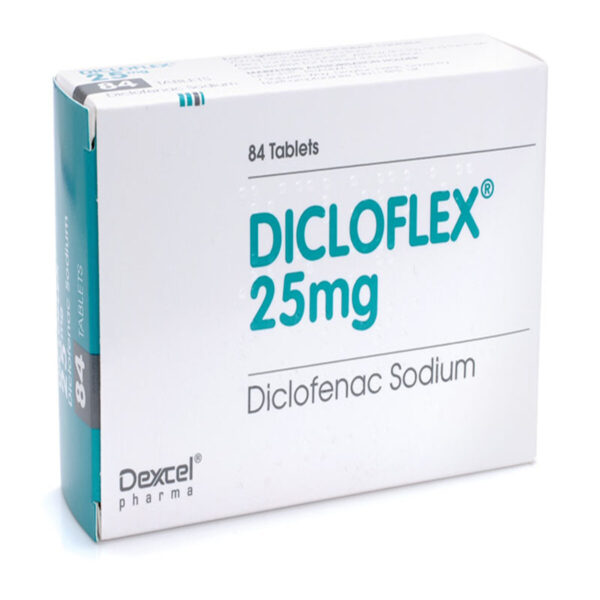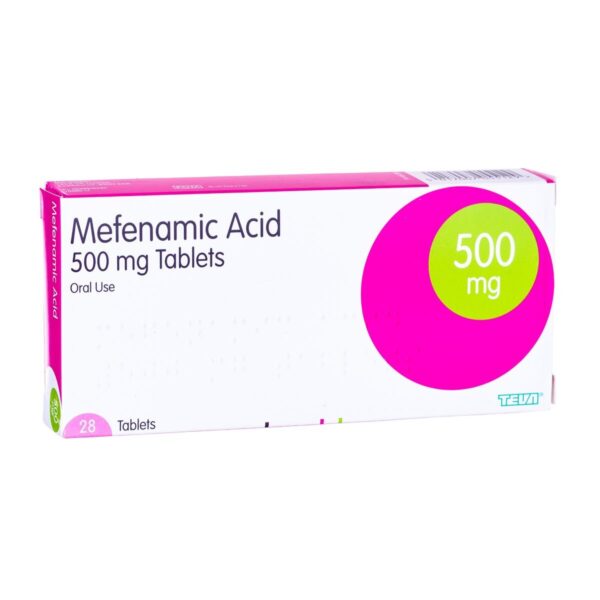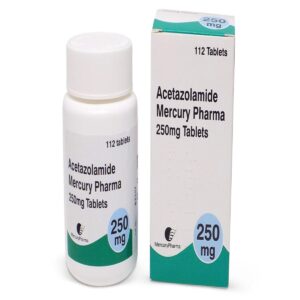- Description
- Brand
- How To Use
- Product Details
- Side Effects
- Ingredients
- How to Store
- Patient Information leaflet
- Questions & Answers
Mefenamic Acid Suspension 50mg/5ml, 125ml
Mefenamic Acid Suspension is a safe and effective non-steroidal anti-inflammatory drug (NSAID) for both adults and children. This product contains mefenamic acid, which helps reduce discomfort and inflammation associated with common ailments such as headaches, muscle pain, and menstrual pain. Mefenamic Acid Suspension is easy to administer, in either liquid form or tablets that can be chewed. For children under 12 years old, the liquid suspension should be used as directed by a doctor. Adults may take either liquid or tablet form with or without meals as needed.
Mefenamic Acid Suspension is proven to provide fast-acting relief of moderate to severe aches and pains associated with everyday body discomfort. It quickly reduces symptoms such as swelling, stiffness, and joint pain without risking side effects that may occur from other traditional medications containing NSAIDs. Mefenamic Acid Suspension is an ideal choice for those seeking natural relief from chronic or occasional health issues without experiencing adverse reactions.
Mefenamic Acid Suspension can be prescribed by vets for use in dogs and cats
Mefenamic Acid Suspension Reviews
After using Mefenamic Acid Suspension, it’s helpful to let others know about your experience. Reviews of an item help other users know that medicines received have helped the condition it is claimed for, how well the treatment worked or any issues to be aware of. We invite our users to leave a review of both their treatment and of the service provided. Click on the reviews tab to see if there has been feedback on this item.
What is the price of Mefenamic Acid Suspension?
The price of Mefenamic Acid Suspension is £279.50
Where can you buy Mefenamic Acid Suspension?
You can buy Mefenamic Acid Suspension at Dock Pharmacy Essex UK, UK Online Pharmacy.
Can you buy Mefenamic Acid Suspension Over the counter?
Mefenamic Acid Suspension is not available to buy over the counter. You need a prescription to buy Mefenamic Acid Suspension
Brand
Mefenamic Acid
How To Use
How to take Mefenamic Acid Suspension
Always take this medicine exactly as your doctor has told you. Your doctor will decide on the appropriate dose to suit your condition. Check with your doctor or pharmacist if you are not sure
Shake the bottle before taking the medicine. –
Take the suspension with or immediately after a meal. –
After taking the suspension, rinse the mouth – this medicine contains sucrose which may be harmful to the teeth if taken for more than 2 weeks. –
Do not drink alcohol while taking Mefenamic Acid.
Alcohol and smoking can irritate the stomach and make some of the side effects worse.
Dosages Adults and the elderly
This medicine is intended for children.
Contact your doctor for dosage advice if you are an adult taking this suspension. Elderly patients are at a higher risk of side effects and should take the lowest effective dose for the shortest possible time, with additional monitoring carried out by their doctor.
Use in children
The recommended dose may be given up to 3 times per day
Product Details
What you need to know before you take Mefenamic Acid Suspension
Do not take Mefenamic Acid Suspension – if you are allergic to mefenamic acid, to any other anti-inflammatory medicines (such as aspirin, ibuprofen, celecoxib), or to any of the other ingredients (listed in section 6) – if you have, or have ever had, stomach or intestinal conditions such as peptic ulcer, bleeding in the stomach or severe gastritis – if you have an inflammatory bowel disease (e.g. ulcerative colitis, Crohn’s disease) – if you have severe heart, liver or kidney problems – if you have just had heart bypass surgery – if you are more than 6 months pregnant. If any of the above apply to you, talk to your doctor or pharmacist. Warnings and precautions Talk to your doctor or pharmacist before taking Mefenamic Acid Suspension: – if you are taking any other NSAIDs (e.g. ibuprofen, diclofenac) – if you are taking any other anti-inflammatory medicines including steroids (e.g. prednisolone) – if you are taking aspirin or medicines that thin the blood (e.g. warfarin, clopidogrel) – if you are taking antidepressants called selective serotonin re-uptake inhibitors (SSRIs) (e.g. paroxetine) 146/L/h/1 2 – if you have kidney or liver problems. Your doctor may check your kidney or liver function before and during treatment – if you are elderly (see section 3) – if you are trying to become pregnant (see section on Fertility) – if you have stomach or digestive tract problems or if you ever had an upset stomach after taking pain killers such as aspirin. Bleeding in the stomach or gut can occur in patients taking Mefenamic Acid – if you have a bleeding disorder or if you are going to have a major operation. Mefenamic Acid can affect the clotting of your blood. It can make you bleed more and for longer than usual – if you have asthma, or a history of asthma, as this medicine may cause breathing difficulties – if you have a connective tissue disorder, e.g. Systemic Lupus Erythematosus (SLE) – if you have epilepsy – if you are dehydrated (thirsty with dry skin, dark urine, dry mouth, headache) – if you have heart problems, previous stroke or think that you might be at risk of these conditions (e.g. if you have high blood pressure, diabetes or high cholesterol or are a smoker). Additional monitoring may be carried out by your doctor. Medicines such as Mefenamic Acid may be associated with a small increased risk of heart attack or stroke. Any risk is more likely with high doses and prolonged treatment. Do not exceed the recommended dose or duration of treatment. Other medicines and Mefenamic Acid Tell your doctor or pharmacist if you are taking, have recently taken or might take any other medicines. Some medicines may be affected by Mefenamic Acid or they may affect how well Mefenamic Acid will work. Tell your doctor or pharmacist if you are taking: – medicines that can increase the chance of getting ulcers or a bleed in the stomach or gut, such as: – corticosteroids used to treat arthritis and inflammation – medicines such as anti-platelet agents, used to thin the blood (e.g. warfarin, aspirin, clopidogrel) – antidepressants called selective serotonin re-uptake inhibitors (SSRIs) (e.g. paroxetine) – any other anti-inflammatory medicines (e.g. diclofenac, celecoxib) – aspirin including low doses of aspirin used to prevent your blood from clotting in certain heart conditions – medicines used for high blood pressure (e.g. atenolol, ramipril, valsartan) – diuretics (water tablets) or heart medicines (e.g. digoxin, sotalol, diltiazem) – some diabetic medicines (e.g. glipizide, glibenclamide) – medicines which suppress the immune system (e.g. ciclosporin, tacrolimus, methotrexate) – lithium, a medicine used to treat mood swings and some types of depression – a medicine usually prescribed through hospitals, called mifepristone (taken within the last 12 days) – quinolone antibiotics (antibiotics used to treat infections) – aminoglycoside antibiotics, used under medical supervision in hospitals – zidovudine, a medicine used for HIV – probenecid, a medicine used in special cases, to protect the kidneys – medicines which bind to protein in the blood – (check with your pharmacist). Blood tests Your doctor may test your blood during treatment. Pregnancy, breast-feeding and fertility If you are pregnant or breast-feeding, think you may be pregnant or are planning to have a baby, ask your doctor for advice before taking this medicine. 146/L/h/1 3 Pregnancy Mefenamic acid will be passed to your unborn baby. It is not known how much it will affect your unborn baby in the first 6 months of pregnancy. DO NOT take the suspension in the last 3 months of pregnancy as it may delay the onset of labour and prolong its duration. It may also increase the likelihood of bleeding in the mother and in the baby. If you need to take this suspension, your doctor can help you decide whether or not to take it during the first 6 months of pregnancy. Breast-feeding Mefenamic acid passes into breast milk and can affect the baby. You should not take the suspension while breast-feeding unless advised by your doctor. Fertility DO NOT take the suspension if you are trying to become pregnant, as it may make it more difficult to get pregnant. You should inform your doctor if you are planning to become pregnant or if you have problems becoming pregnant. Driving and using machines Mefenamic acid may cause drowsiness, dizziness, fatigue or affect your vision. If any of these occur do not drive, use machinery, or perform any tasks that may require you to be alert. Mefenamic Acid Suspension contains: – Ethanol (alcohol) This medicine contains 26 mg of alcohol (ethanol) in each 5 ml suspension which is equivalent to 5.2 mg/ml. The amount in 5 ml of this medicine is equivalent to less than 1 ml beer or 1 ml wine. The small amount of alcohol in this medicine will not have any noticeable effects. – Propylene glycol (E 1520) This medicine contains 11 mg propylene glycol (E 1520) in each 5 ml suspension which is equivalent to 2.15 mg/ml. If your baby is less than 4 weeks old, talk to your doctor or pharmacist before giving them this medicine, in particular if the baby is given other medicines that contain propylene glycol or alcohol. – Sodium This medicine contains 14 mg sodium (main component of cooking/table salt) in each 5 ml suspension. This is equivalent to 0.68% of the recommended maximum daily dietary intake of sodium for an adult. – Sodium Benzoate (E 211) This medicine contains 25 mg sodium benzoate (E 211) in each 5 ml suspension which is equivalent to 5 mg/ml. Sodium benzoate may increase jaundice (yellowing of the skin and eyes) in newborn babies (up to 4 weeks old). – Sorbitol (E 420) This medicine contains 530 mg sorbitol (E 420) in each 5 ml suspension which is equivalent to 106 mg/ml. Sorbitol is a source of fructose. If your doctor has told you that you (or your child) have an intolerance to some sugars or if you have been diagnosed with hereditary fructose intolerance (HFI), a rare genetic disorder in which a person cannot break down fructose, talk to your doctor before you (or your child) take or receive this medicine. Sorbitol may cause gastrointestinal discomfort and mild laxative effect. – Sucrose Contains 1 g of sucrose per 5 ml suspension. This should be taken into account in patients with diabetes mellitus. If you have been told by your doctor that you have an intolerance to some sugars, contact your doctor before taking this medicinal product. May be harmful to your teeth.
Side Effects
Possible side effects
Like all medicines, this medicine can cause side effects, although not everybody gets them. Do not be alarmed by this list of possible side effects. You may not experience any of them. Stop taking the suspension and seek medical help immediately if you have any of the following allergic reactions: – difficulty breathing or swallowing, swelling of the face, lips, tongue or throat – severe itching of the skin, with a red rash or raised lumps – blistering of the mouth, eyes, and genital region, patchy areas of rash, peeling skin 146/L/h/1 5 or any of the following reactions – diarrhoea – passing blood in your stools (faeces/motions) – passing black tarry stools – vomiting any blood or dark particles that look like coffee grounds. Seek immediate medical attention if you have any of the following symptoms: – indigestion or heartburn, abdominal pain (pain in your stomach) or other abnormal stomach symptoms, nausea (feeling sick), vomiting – any unusual bruising or bleeding, for example nose-bleeds, pinpoint red spots on the skin, unusual purple bruise-like rash on the skin or in the mouth – signs of anaemia such as feeling tired, breathless, and looking pale – fever, sore throat, mouth ulcers, repeated infections or infections that will not go away. This may be due to a low level of white blood cells – seizures (fits) – signs of low sodium levels such as headache, nausea, vomiting, tiredness, muscle cramps – sudden headache, stiff neck, fever, sensitivity to bright light, drowsiness and muscle pain, with or without a rash – fever, rash, nausea, aches and pains, passing more or less urine than usual, passing red urine or passing urine at night. This may be due to changes in your kidneys – sudden loss or blurring of vision, loss of colour vision, eye pain which worsens with eye movement – headache, in particular on waking in the morning. This may be due to high blood pressure – pain behind the ribs radiating towards the back, often worse when lying down, nausea, vomiting, fever. This may be due to inflammation of your pancreas – yellowing of your skin or eyes, pale faeces and dark urine, unexplained persistent nausea, stomach problems, loss of appetite or unusual tiredness. This may be due to changes in your liver – low body temperature (below 35°C), feeling cold with pale-looking skin, especially in children. The side effects listed below have been reported: Not known: frequency cannot be estimated from the available data. – head-spins (vertigo) – hallucinations – rapid heartbeat (palpitations) – mental confusion – constipation or bloating – blurred vision, eye irritation – feeling ill (malaise) – ringing or buzzing in the ears (tinnitus) – numbness or tingling in hands or feet – sudden poor blood sugar control if you have diabetes. Your doctor or pharmacist can measure your sugar levels – asthma or asthma that is worse than usual – swelling of your hands and feet (around the ankles) – sore mouth (pain or ulcers on the tongue, cheeks, lips, throat or gums) – dizziness, drowsiness, feeling lethargic and tired – signs of low blood pressure such as light-headedness – reactions to the sun. Your skin may become red, painful and swollen – do not sunbathe, use a sun bed, or expose your skin to artificial UV light. – depression – inability to sleep – nervousness – sweating – fatty stools – loss of appetite 146/L/h/1 6 – ear pain. Medicines such as Mefenamic Acid may be associated with a small increased risk of heart attack or stroke. (see section 2 – end of ‘Warnings and precautions’). Urine tests Tell the doctor if you are having urine tests, as your medicine may affect the results. Reporting of side effects If you get any side effects, talk to your doctor or pharmacist. This includes any possible side effects not listed in this leaflet. You can also report side effects directly via the Yellow Card Scheme at: www.mhra.gov.uk/yellowcard or search for MHRA Yellow Card in the Google Play or Apple App Store. By reporting side effects you can help provide more information on the safety of this medicine.
Ingredients
What Mefenamic Acid Suspension contains –
The active substance is mefenamic acid (50 mg per 5 ml). –
The other ingredients are aluminium magnesium silicate, povidone, sodium hydroxide, glucono delta lactone, hydrochloric acid, sorbitol (E 420), sodium benzoate (E 211), saccharin sodium, sucrose, caramellose sodium, ethanol (alcohol), banana flavour (contains propylene glycol (E 1520)), anise mint, chocolate flavour (contains propylene glycol (E 1520)) and purified water. (see end of section 2 for further information on ethanol, propylene glycol, sodium, sodium benzoate, sorbitol, and sucrose).
How to Store
How to store Mefenamic Acid Suspension
Keep this medicine out of the sight and reach of children. Do not take after the expiry date which is stated on the bottle label and on the carton after EXP. The expiry date refers to the last day of that month. Store below 30°C. Do not throw away any medicine via wastewater or household waste. Ask your pharmacist how to throw away medicine you no longer use. These measures will help protect the environment
Patient Information leaflet
Click here for the Patient Information leaflet
Please read before using the product
Questions and answers of the customers
There are no questions yet, be the first to ask something for this product.
You Might Also Like
Original price was: £42.50.£31.50Current price is: £31.50.
Original price was: £42.50.£31.50Current price is: £31.50.
- Availability: in stock
Original price was: £9.32.£6.90Current price is: £6.90.
Diclofenac Tablets 25mg, 84 Tablets Diclofenac Tablets 25mg provide fast and confident relief for inflammation and pain. This non-steroidal anti-inflammatory (NSAID) aids in reducing mild to moderate pain and inflammation, helping your body get back to feeling great. The chemical compound diclofenac sodium, the active ingredient in this tablet, is safely formulated to provide a […]
Learn MoreOriginal price was: £9.32.£6.90Current price is: £6.90.
- Availability: in stock
Original price was: £14.45.£10.95Current price is: £10.95.
Aceclofenac Tablets 100mg, 60 Tablets Aceclofenac tablets are specifically designed to provide fast and effective relief from pain associated with arthritis, musculoskeletal disorders, and other debilitating conditions. Formulated with advanced technologies, these tablets contain a medicine called aceclofenac—a non-steroidal anti-inflammatory drug (NSAID) that works by reducing inflammation and suppressing physical pain. This method of treatment […]
Learn MoreOriginal price was: £14.45.£10.95Current price is: £10.95.
- Availability: in stock
Lodine SR Tablets 600mg – Etodolac 600mg, 30 Tablets Lodine SR Tablets 600mg are the perfect solution for providing relief from numerous painful symptoms related to rheumatoid arthritis and osteoarthritis. This long-lasting product is packed with 600mg of the active ingredient etodolac, and its slow-release formula means only one tablet needs taken each day. Lodine […]
Learn More£23.25
- Availability: in stock
Original price was: £37.50.£26.50Current price is: £26.50.
Original price was: £37.50.£26.50Current price is: £26.50.
- Availability: in stock
Other Products From This Seller
Original price was: £34.99.£24.95Current price is: £24.95.
Wahl Extreme Grip Beard Trimmer Precision Grooming with Comfort Grip and Adjustable Cutting Lengths Take Control of Your Grooming with the Wahl Extreme Grip Beard Trimmer Transform your grooming routine with the Wahl Extreme Grip Beard Trimmer, designed for precision, comfort, and versatility. Whether you’re sculpting a sharp beard line, maintaining stubble, or styling longer […]
Learn MoreOriginal price was: £34.99.£24.95Current price is: £24.95.
- Availability: in stock
Original price was: £23.99.£17.95Current price is: £17.95.
WAHL Vogue Corded Hair Clipper for Men Professional Precision with Adjustable Taper Lever and High-Carbon Steel Blades Transform Your Grooming Routine with the WAHL Vogue Corded Hair Clipper for Men Elevate your grooming experience with the WAHL Vogue Corded Hair Clipper, a professional-grade grooming tool designed for men who value precision and performance. Whether you’re […]
Learn MoreOriginal price was: £23.99.£17.95Current price is: £17.95.
- Availability: in stock
Original price was: £30.00.£8.95Current price is: £8.95.
Wahl Peaky Blinders Beard Trimmer Gift Set Limited Edition Cordless Grooming Kit for Men Join the ranks of the Peaky Blinders with the Wahl Peaky Blinders Beard Trimmer Gift Set. This exclusive collaboration between Wahl and the iconic TV series offers a comprehensive grooming solution for the modern gentleman. Key Features: Rechargeable Cordless Trimmer: Equipped […]
Learn MoreOriginal price was: £30.00.£8.95Current price is: £8.95.
- Availability: in stock
Original price was: £54.63.£39.95Current price is: £39.95.
OMRON RS2 Wrist Blood Pressure Monitor Compact and Accurate BP Monitoring The OMRON RS2 Wrist Blood Pressure Monitor is a compact and user-friendly device designed for quick and accurate blood pressure and pulse rate measurements. Utilizing the oscillometric method, it ensures reliable readings with minimal user input. Key Features: Automatic Inflation: The device inflates the […]
Learn MoreOriginal price was: £54.63.£39.95Current price is: £39.95.
- Availability: in stock
Original price was: £69.99.£59.99Current price is: £59.99.
Omron M4 Intelli IT Blood Pressure Monitor Bluetooth-Enabled Upper Arm BP Monitor with Intelli Wrap Cuff The Omron M4 Intelli IT Blood Pressure Monitor is a clinically validated device designed for easy and accurate blood pressure monitoring at home. With Bluetooth connectivity, it seamlessly syncs your readings to the Omron Connect app, allowing you to […]
Learn MoreOriginal price was: £69.99.£59.99Current price is: £59.99.
- Availability: in stock
Original price was: £39.99.£33.95Current price is: £33.95.
Omron M2+ Upper Arm Blood Pressure Monitor The Omron M2+ Upper Arm Blood Pressure Monitor is a fully automatic device designed to provide quick and accurate blood pressure and pulse rate measurements. Utilizing the oscillometric method, it ensures reliable readings with minimal user input. Key Features: IntelliSense Technology: Automatically inflates the cuff to the ideal […]
Learn MoreOriginal price was: £39.99.£33.95Current price is: £33.95.
- Availability: in stock
Original price was: £19.99.£9.95Current price is: £9.95.
Ted Baker M Gift Set 30ml EDT Spray and 150ml Body Wash Experience the refined elegance of the Ted Baker M Gift Set, comprising a 30ml Eau de Toilette Spray and a 150ml Body Wash. This meticulously crafted set offers a harmonious blend of notes, encapsulating masculinity and sophistication. Ideal for gifting or personal indulgence, […]
Learn MoreOriginal price was: £19.99.£9.95Current price is: £9.95.
- Availability: in stock
Original price was: £33.00.£19.99Current price is: £19.99.
Iceberg Twice Pour Homme Eau de Toilette 125ml Gift Set Aromatic Fougère Fragrance for Men Discover the timeless elegance of Iceberg Twice Pour Homme Eau de Toilette 125ml Gift Set, a sophisticated aromatic fougère fragrance designed for the modern man. This exclusive gift set includes a 125ml Eau de Toilette, offering a complete scent experience […]
Learn MoreOriginal price was: £33.00.£19.99Current price is: £19.99.
- Availability: in stock
Original price was: £44.00.£28.95Current price is: £28.95.
Davidoff Cool Water Gift Set For Men, 2pc Gift set Dive into the invigorating essence of the ocean with the Davidoff Cool Water Gift Set for Men. This exclusive 2-piece set includes a 4.2 fl. oz. Eau de Toilette and a 2.5 fl. oz. After Shave Balm, offering a complete grooming experience that embodies freshness […]
Learn MoreOriginal price was: £44.00.£28.95Current price is: £28.95.
- Availability: in stock
Original price was: £19.95.£9.95Current price is: £9.95.
Ted Baker W Pink Gift Set 30ml EDT and 150ml Shower Gel Experience the elegance of Ted Baker W Pink Gift Set, comprising a 30ml Eau de Toilette and a 150ml Shower Gel. This exquisite set offers a harmonious blend of floral and woody notes, encapsulating femininity and sophistication. Ideal for gifting or personal indulgence, […]
Learn MoreOriginal price was: £19.95.£9.95Current price is: £9.95.
- Availability: in stock




















